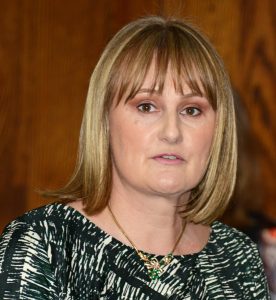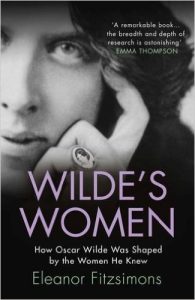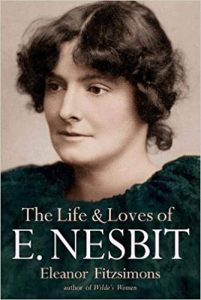Talking About Women’s History: Two Questions and an Answer from Eleanor Fitzsimons
Eleanor Fitzsimons is an Irish researcher and writer who specialises in historical and current feminist issues. She has an MA (first class honours) in Women, Gender and Society from University College Dublin. Fitzsimons is the author of Wilde’s Women: How Oscar Wilde Was Shaped by the Women He Knew (Duckworth, 2015). She is an honorary patron of the Oscar Wilde Society, and a member of the editorial board for society journal The Wildean. She has worked as a television researcher for the Irish national broadcaster RTÉ, and was a contributor to The Importance of Being Oscar (BBC2, April 2019). Her second biography The Life and Loves of E. Nesbit (Duckworth, 2019) was a Sunday Times Book of the Year 2019, and was included in the Washington Post Top 50 Non-Fiction Books of 2019 and the Dallas Morning News Top 100 Books of 2019. Her work has been published in several academic journals and books.
Take it away, Eleanor!
What do you find most challenging or most exciting about researching historical women?
In a sense, the aspect I find most challenging about researching historical women is also what makes this research most exciting and rewarding. I’m sure we’re all acutely conscious of the fact that women’s lives have often been very poorly documented. Where their experiences have been chronicled, this was often done through a gendered lens, their achievements undervalued or, if deemed worthy of commenting on, attributed to men. When researching my most recent biography, The Life and Loves of E. Nesbit, I discovered that many reviewers assumed Edith Nesbit was a man. One critic in The Graphic described her as “a man of rare poetic gifts and of true honest purpose”. Nesbit was fully aware of this confusion and occasionally found it funny. “All the reviewers took me for a man,” she told a friend, “and I was Mr Nesbit in the mouth of all men until I was foolish enough to dedicate a book to my husband, and that gave the secret away”. Literary women have often found it beneficial to disguise their identity, or even to write as men. Similarly, women who operated in traditionally masculine spheres, such as politics, science or medicine, were often castigated for not behaving as they should. In each case, you are required to challenge and evaluate what are often very biased accounts of their lives.
When we recover women’s lives, the challenge often lies in finding any information about them at all. The advantage of having to work harder is that those of us who write about women are obliged to seek out neglected primary sources – letters, diaries, census records, death certificates, court records such as bankruptcy proceedings, and accounts left by reliable family members and friends. I find this so rewarding and exciting. In a sense, I regard myself as a literary detective, a Miss Marple of the archives. When I wrote about Harriet Westbrook Shelley, first wife of Romantic poet Percy Shelley, who was completely overshadowed by his second wife, Mary, one of my better sources was a series of letters she exchanged with a remarkable Irishwoman named Catherine Nugent. Although she never married, Catherine felt obliged to pose as a widow and call herself “Mrs Nugent”. A male friend described her thus: “a wonderful woman—altho’ very plain, little and republican looking . . . Catherine Nugent has amazing spring and elasticity of mind, as if her mind made her forget that she had a weak body”. Both women are largely forgotten. Fortunately, their letters, with notes about Catherine’s life, were published by her friend Alfred Webb, a printer in Dublin, as Harriet Shelley’s Letters to Catherine Nugent. Such treasures are often buried in the archives but digitization of old books has ensured that they are increasingly accessible to us all.
What work of women’s history have you read lately that you loved? (Or for that matter, what work of women’s history have you loved in any format?)
There are so many worthy candidates! I’m going to choose a brilliant but unconventional book, A Ghost in the Throat by Irish poet and essayist Doireann Ní Ghríofa. Using beautiful, lyrical language, Ní Ghríofa intertwines her own experiences as a young mother in modern-day Ireland, with the story of Eibhlín Dubh Ní Chonaill, an Eighteenth-Century Irish noblewoman. On discovering her husband has been murdered, Eibhlín drinks handfuls of his blood and composes an extraordinary poem, Caoineadh Airt Uí Laoghaire, in his honour. Enchanted by this powerful poem, Ní Ghríofa becomes obsessed with uncovering the truth about the interior and exterior life of the shadowy woman who wrote it. The biographical details she uncovers are compelling enough, but what really sets this exceptional book apart is Ní Ghríofa’s extraordinary insights into the way we are shaped by our experiences, her enchanting exploration of language and ideas, and her celebration of the power of words to console and transport us. I cannot recommend it enough!
A question from Eleanor: I think Women’s History Month is fantastic! What do you think the key achievement of the celebration of Women’s History Month has been? Does it allow us to reach and retain an audience that would never normally take an interest in the lives and experiences of women?
As so many of us do, I have mixed feelings about Women’s History Month.
On the one hand, I wish that we didn’t need it: that’s women’s roles in history were simply an integrated part of how we think about history and the way history is taught. But that simply isn’t true: according to a statistic shared by the Remedial Herstory Project, in 2022 teachers spent between five and twenty percent of their history curriculum time on women’s history, with five percent being the plurality. (What do you want to bet that most of that five percent occurred during Women’s History Month?) That means that the mandate to teach and talk about women’s history in March remains important.
At the same time, I LOVE the festival feeling that surrounds Women’s History Month. Every year, I make new connections with other people who share my passion for this subject—here at History on the Margins and elsewhere. With each new connection, we amplify each other’s reach.
***
Want to know more about Eleanor Fitzsimons and her work?
Check out her website: https://eafitzsimons.wordpress.com/
Follow her on Twitter: https://twitter.com/EleanorFitz
***
Come back tomorrow for three questions and an answer with historian Einav Rabinovitch-Fox







